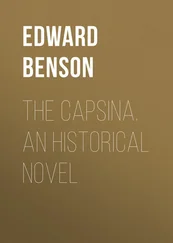Edward Benson - Arundel
Здесь есть возможность читать онлайн «Edward Benson - Arundel» — ознакомительный отрывок электронной книги совершенно бесплатно, а после прочтения отрывка купить полную версию. В некоторых случаях можно слушать аудио, скачать через торрент в формате fb2 и присутствует краткое содержание. Жанр: foreign_prose, на английском языке. Описание произведения, (предисловие) а так же отзывы посетителей доступны на портале библиотеки ЛибКат.
- Название:Arundel
- Автор:
- Жанр:
- Год:неизвестен
- ISBN:нет данных
- Рейтинг книги:4 / 5. Голосов: 1
-
Избранное:Добавить в избранное
- Отзывы:
-
Ваша оценка:
- 80
- 1
- 2
- 3
- 4
- 5
Arundel: краткое содержание, описание и аннотация
Предлагаем к чтению аннотацию, описание, краткое содержание или предисловие (зависит от того, что написал сам автор книги «Arundel»). Если вы не нашли необходимую информацию о книге — напишите в комментариях, мы постараемся отыскать её.
Arundel — читать онлайн ознакомительный отрывок
Ниже представлен текст книги, разбитый по страницам. Система сохранения места последней прочитанной страницы, позволяет с удобством читать онлайн бесплатно книгу «Arundel», без необходимости каждый раз заново искать на чём Вы остановились. Поставьте закладку, и сможете в любой момент перейти на страницу, на которой закончили чтение.
Интервал:
Закладка:
It is clear "what was the matter," in medical phrase, with this handsome and lively young man. At heart he was an idealist, but one ready to capitulate, to surrender to beleaguering common sense. He was ready to sacrifice his dreams, a somewhat serious offence in a world where true dreamers are so rare. By nature he was a true dreamer, but accumulating wealth and the dense comfort of life at Heathmoor had done much to rouse him, though in music he still saw the fiery fabric, unsubstantial and receding. In performance he was quite execrable, in imagination of the highest calibre. Through all his patient and heavy strumming he heard the singing of the immortal bird, and even his reputation as a piano-player in the drawing-rooms of Heathmoor had not made him lose his profound appreciation of his own incompetence. But in music alone was he worthy any more of the title of a dreamer; to-day he stood pen in hand ready to sign the greatest capitulation to common sense that a man is ever called upon to make, for he was ready to give up the image of the invisible conjectured She that stood faintly glimmering in the inmost chamber of his heart and throw it open for a charming enemy to enter.
It was not long before he gave up his attempts on the piano, for this invitation to lunch next door had caused him to take a definite resolution which upset all steadiness and concentration, and, lighting a pipe, he strolled out into his garden. He had not room there for a full-sized croquet lawn, and had contented himself with three or four hoops of ultra-championship narrowness, through which, with the fervour of the true artist, he was accustomed to practise various awkward hazards. But here, again, as by the piano, desire failed, and, with an extinguished pipe, he sat down on a garden-seat, and experienced a sharp attack of spurious middle-age, such as is incidental to youth, regretting, as youth does, the advent of the middle-age, which in reality is yet far distant. He had completely made up his mind to propose to Edith that day, believing, without coxcombry, that he would be accepted, believing also that the future thus held for him many years of health and happiness, with the addition, no slight one, of a charming and inalienable companion whom he liked and admired. Yet something, the potentiality of the fire which had never yet been lit in him, caused him an infinite and secret regret for the step which was now as good as taken. He longed for something he had never experienced, for something of which he had no real conception, but of which he felt himself capable, for, as the flint owns fire in its heart, but must wait to be struck, he felt that his true destiny was not to be but a stone to mend a road, or, at the best, to be mortared into a house-wall, with all his fiery seed slumbering within him. Yet … what if there was no fire there at all? He had long held himself ready, aching, you might say, for the blow that should evoke it, and none had struck him into blaze.
It was not surprising that the approaching motor-drive to Bath loomed conversationally large at lunch, and Edward proved weighty in debate. He had a sharp, decisive habit in social affairs; his small change of talk was bright and fresh from the mint, and seemed a faithful index to his keen face and wiry, assertive hair.
"Quite right not to break the journey, Mrs. Hancock," he said. "Most country hotels consist of feather-beds, fish with brown sauce, and windows over a stable-yard. But if you do it in one journey, get most of it over before lunch. I should start by ten at the latest."
Mrs. Hancock consulted a railway time-table.
"Then Filson will have to be finished with her packing at half-past nine," she said. "The heavy luggage must go to the station in the car before we start."
"Have it sent in a cab afterwards," suggested Holroyd.
Mrs. Hancock pondered over this.
"I don't think I should like that, should I, Edith?" she said. "I should prefer to see it actually leave the house. Or can I trust Lind and Filson? Edith, dear, remember to remind me to take the patience cards in my small bag. There is room to lay out a patience on the folding-table in the car, and it will help to pass the time."
"And have you got footstools?" asked Edward.
Over Mrs. Hancock's face there spread a smile like the coming of dawn. Here was a comfort that had never occurred to her.
" What a good idea!" she said. "I have often felt a little strained and uncomfortable in the knees when motoring for more than an hour or two. Very likely it was just the want of a footstool. Remind me to take out my bedroom footstool in the car this afternoon, Edith, to see if it is the right height. You are helpful, Mr. Holroyd. I never thought of a footstool."
His next half-dozen suggestions, however, showed that Mrs. Hancock had thought of a good deal already, including a Thermos flask of coffee, a contour map of the country, and a stylograph pen in case she found that she had left anything behind, and wanted to write a postcard en route . Postcards she always carried in a green morocco writing-case.
"Filson must take a postcard, too," she said, "ready directed to Lind, in case anything goes wrong with the luggage. That is a good idea. She will be very comfortable, do you not think, Mr. Holroyd, in a nice third-class compartment for ladies only. I am often tempted to go third-class myself, when I see how cheap and comfortable it is."
Edward felt quite certain that this was a temptation to which Mrs. Hancock had never yielded, and lunch proceeded in silence for a few moments. Then, since nobody was able to make any further suggestion whatever which could lead to additional comfort or security on this momentous journey, Mrs. Hancock allowed herself to be drawn into other topics, still not unconnected with Bath, such as the efficacy of the waters, and the steepness of the hills which surrounded it, which, however, with Denton's careful driving and the new brakes she had had fitted to her car, presented no unmanning terrors.
"I shall be there," she said, "exactly four weeks, so as to get back early in June. Bath is very hot in the summer, but I do not mind that, and the hotel rates are more reasonable then. After that we shall be occupied, for my niece, Elizabeth Fanshawe, will arrive almost as soon as I return. She will be with me till she goes back to India to her father in October."
Out of the depths of half-forgotten memories an image, quite vague and insignificant, broke the surface of Holroyd's mind.
"Was she not with you two years ago?" he asked. "A tall, dark girl with black hair."
"Fancy your remembering her! I so envy a good memory. Edith, dear, remind me to get the piano tuned. I will write from Bath. Elizabeth is for ever at the piano now, so my brother tells me. She will enjoy hearing you play, Mr. Holroyd. Well, if everybody has finished, I am sure you will like to have a cigarette in the garden. Edith will take you out and show you the tulips."
It must not be supposed that this arrangement was to be dignified into the name of manoeuvre on Mrs. Hancock's part, except in so far that after lunch she liked to skim the larger paragraphs of the Morning Post, comfortably reclining on the sofa in her private sitting-room. She was not a person of subtle perceptions, and it had certainly never occurred to her that Holroyd had come to lunch that day with his purpose formed; she only wanted to read the Morning Post, and, as usual, to throw him and Edith together. As for Edith, she had been quite prepared a dozen times during this last month to listen with satisfaction to his declaration, and to give him an amiable affirmative on the earliest possible occasion. Each time that her mother arranged some similar little tête-à-tête for them she felt a slight but pleasurable tremor of excitement, but was never in the least cast down when it proved that her anticipations were premature. She was perfectly aware of her mother's approval, and it only remained to give voice to her own. She had long ago made up her mind that she would sooner marry than remain single, and she had never dreamed or desired that it should be any other man than this who should conduct her to the goal of her wishes. That she was in any degree in love with him – if the phrase connotes anything luminous or tumultuous – it would be idle to assert; but equally idle would it be to deny that, according to the manner of her aspirations, he seemed to her an ideal husband. For ten adolescent years – for she was now twenty-four – she had lived in the stifling and soul-quelling comfort of her mother's house, and it would have been strange if the dead calm and propriety of her surroundings had not bred in her a corresponding immobility of the emotions, for there is something chameleon-like in the spirit of every girl not powerfully vitalized; it assimilates itself to its surroundings, and custom and usage limn the hues, which at first are superficial and evanescent, into stains of permanent colour. Passion and deep feeling, so far from entering into Edith herself, had never even exhibited themselves in the confines of her horizons; she had neither experienced them nor seen others in their grip. But she thought – indeed, she was certain – that she would like to be mistress in the house where Edward Holroyd was master. She felt sure she could make herself and him very comfortable.
Читать дальшеИнтервал:
Закладка:
Похожие книги на «Arundel»
Представляем Вашему вниманию похожие книги на «Arundel» списком для выбора. Мы отобрали схожую по названию и смыслу литературу в надежде предоставить читателям больше вариантов отыскать новые, интересные, ещё непрочитанные произведения.
Обсуждение, отзывы о книге «Arundel» и просто собственные мнения читателей. Оставьте ваши комментарии, напишите, что Вы думаете о произведении, его смысле или главных героях. Укажите что конкретно понравилось, а что нет, и почему Вы так считаете.











